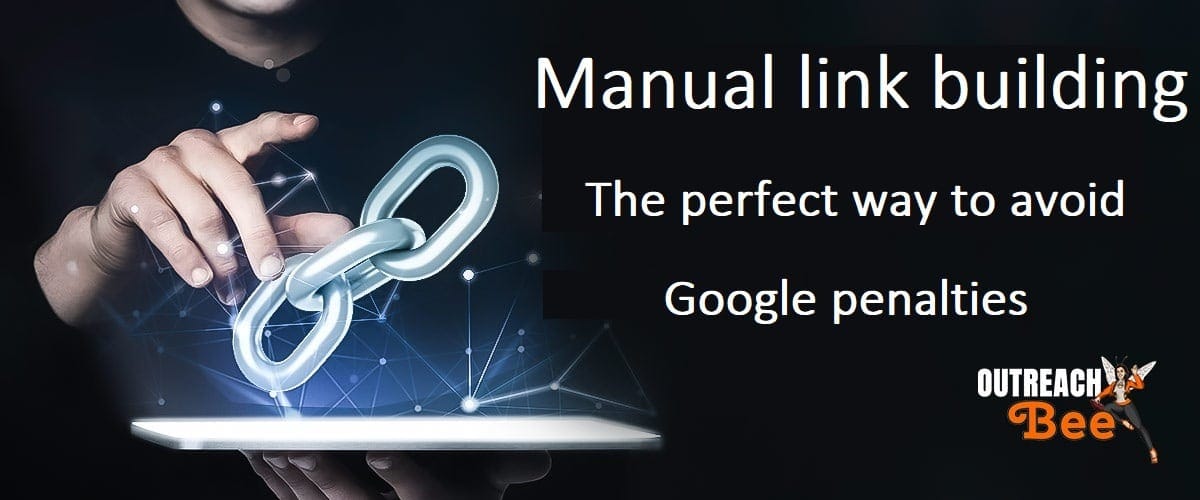Yes, manual link building is the best way to avoid Google penalties and we will tell you why if you continue reading this post.
As a sub-discipline of SEO, manual link building service primarily aims to improve the search engine rankings of websites. Search engines decide how important a website is by looking at the links that go to its pages. To do well in search engines, your website should have lots of high-quality links pointing to it.
Backlinks are links on other websites that lead to your website. They act like recommendations for your website. One way to get backlinks is to write a guest posts on another website and include a link to your website. This is called off-page optimization because the links are placed on other websites. A backlink is like an incoming reference for the website it points to.
In this guide, we will walk you through the DON’Ts of link building, to avoid Google penalties. Also, we will share a few tips for the success of your manual outreach link building campaign.
Manual link building as a ranking factor to avoid Google penalties
A website can get visitors via backlinks, but that is not the actual goal of manual link building. Above all, search engine optimization should be promoted via a meaningful link structure as this process will avoid Google penalties and, of course, in the long term, you gain more visitors through a good manual placement in the search result lists than through average backlinks.
In general, the reputation of a website in search engines is judged on the basis of two factors:
- Quantity: the more times other websites link to your website, the better your website looks.
- Quality: but it’s not just about the number of links, it’s also about the quality of the websites that the links come from.
For example, if a backlink is from a website that is positively rated by the search engines (e.g., on a well-known, relevant, and/or trustworthy website), it will make your website look better than if a little-known and untrustworthy website links to yours.
As a principle, the better known the website and the more relevant its content is for the topic of the backlink, the better the conditions for an increase in website reputation.
Now that you understand how manual link building is important as a ranking factor and to avoid Google penalties, let’s talk about one of the main techniques to find good manual link building opportunities: competitive analysis.
Competitive analysis: a key factor in your manual outreach link building
By analyzing links from reputable sites that already rank well, you can gain insight into your competitors’ strategies and determine what steps you can take to improve your own performance. However, before beginning this task, it’s essential to identify your competitors, which can be a time-consuming process if done manually via Google search. Fortunately, there are SEO tools available that simplify the competitive analysis process.
These tools can identify your competitors with just a few clicks and provide valuable information about their referral sources, anchor texts, traffic, and page authority. Additionally, they can help you determine which topics your competitors are excelling in beyond simply the number of incoming links.
Once you’ve identified your competitors and analyzed their manual link building strategies, you can begin to replicate their efforts manually. However, it’s essential to note that their tactics may not align with your own strategy. For example, a gaming influencer may be successful in securing paid placements from major manufacturers. At the same time, a newcomer to game design may struggle to generate backlinks from large video game companies.
Ultimately, it’s up to you to reach out to the sites you identify as useful sources and offer something of greater value than what is currently available. Additionally, it’s crucial to uncover your competitors’ structures and strategies to identify areas where you can differentiate yourself and gain a competitive edge.
It’s time to discuss a few things that you should Never do while doing a manual outreach link building campaign.
4 link building DON’Ts: Misuse of PageRank
The manipulation of PageRank goes against organic link growth. In the natural development of a website, its topics and quality primarily influence how well-known a website becomes and how often its websites are linked. The principle behind it is as simple as it is true: If an online presence is relevant for many users, its awareness will gradually increase, and the number of incoming links will actually increase as a result.
In the past, however, such natural link growth was often artificially simulated using various methods in order to increase the PageRank rating of websites:
- Link purchase and link rental: These terms basically summarize the paid placement of backlinks on other websites. The pages on which the links are placed often have little or no thematic relation with the linked content but primarily serve only as a link platform.
- Link farms and link networks: These are websites whose main goal is to link to different websites – relevant content can, therefore, hardly be found on them. Website operators can buy a certain number of links via link farms and link networks in order to get many backlinks for their online presence in a very short time.
- Disproportionate link exchange: In a link exchange, two or more websites generally link their online presence to each other. This can either be a completely natural process (e.g., with a guest post), or it can take place on a very large scale, causing the number of backlinks to skyrocket quickly. Such excessive link exchange (e.g., through the use of link exchange networks) is intended to increase the visibility of websites in search engines.
- Links in comments, forums, etc.: Websites can often get backlinks using the comment function of websites, blogs, and social media. Such links can also be placed in forums and wiki entries. It is not uncommon for website operators to use such platforms to get new backlinks. Most users see this as a shady method or spam, especially if the posts are purely promotional in nature and do not offer any added value for a discussion in a forum or for a wiki article. For this reason, some websites have switched to automatically adding a rel-nofollow to the comment links. This devalues the links for the search engine ranking.
- Expired domains: they are web addresses that were previously in use but are now free for new registrations. Suppose these have a positive backlink profile (which persists for some time after the previous owner has opted out). In that case, the notoriety of such domains can be used to give a new website a competitive advantage in search engine rankings with immediate effect. While many site owners still use these in moderation, they are not the best kind of links (definitely not manual).
While these techniques were working for many years, they will guarantee you a penalty in 2023. It’s all thanks to Google’s Penguin, a game changer update for SEO.
Google Penguin update
Some of the link-building techniques mentioned earlier were highly effective in improving the ranking of websites – even those without high-quality content that would justify a top position on the search engine results page. This led to artificial manipulation of indexing, which prompted Google to revise its search engine algorithm and optimization guidelines with the Penguin update. Since the activation of Google Penguin, there is a risk that such unnatural link-building practices may result in penalties.
The Penguin update was rolled out in 2012 and introduced new criteria for evaluating links, including the number of backlinks and the quality of the blogs that they are coming from. This change has been adopted by most other search engines, leading to the introduction of numerous new rules in the area of linking building. As a result, the link-building methods mentioned earlier may now have a negative impact on a website’s visibility in search engines if used excessively instead of just a positive effect.
Takeaway
In essence, the more links a website receives that are viewed positively by search engines such as Google and Bing, the higher the website will rank in search results. However, it’s not just the number of backlinks that matters but also the quality and reputation of the linking websites. Therefore, a strategic approach to manual link building can improve the ranking of individual web pages and boost traffic to the entire online platform.
Despite the Google Penguin update, there are still opportunities to benefit from external links, and many link-building tools can aid in the implementation of various link-bait campaigns. When building manual links, it’s crucial to prioritize the quality of content, as well as consider the needs of the target audience and adhere to search engine guidelines. We at Outreach Bee follow these principles to establish a solid foundation for the natural link growth of our clients. If you are looking for the safest manual outreach link building service, we are your best choice. Contact us today to start working on your business authority.



The main benefits of manual Link building
Is Mutual Link Building Worth it in 2023? Can It Hurt or Benefit Your SEO?